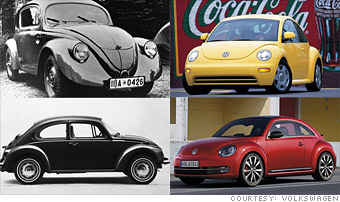The Volkswagen Beetle, often affectionately referred to as the “Bug,” is one of the most iconic and enduring automobiles in history. Conceived in the 1930s, it was a brainchild of Ferdinand Porsche, commissioned by Adolf Hitler, who envisioned a “people’s car” (Volkswagen in German) that would be affordable and practical for the average German family. The car was officially named the “Käfer” (German for beetle) due to its distinctive rounded shape, reminiscent of the insect.
The Beetle’s production began in earnest after World War II, with the British Army overseeing the revival of Volkswagen’s heavily bombed factory in Wolfsburg. The first significant milestone came in 1945 when the factory produced its first car under British control. The Beetle’s simple, air-cooled rear engine, reliability, and affordability quickly made it a favourite in post-war Europe. Its success soon crossed the Atlantic, with the Beetle becoming immensely popular in the United States during the 1950s and 1960s, a period that cemented its status as a cultural icon.
Throughout the 1960s, the Beetle’s popularity soared, and it became a symbol of the counterculture movement. Its quirky design and unpretentious nature appealed to young people seeking an alternative to the larger, more ostentatious American cars of the time. The Beetle also featured prominently in popular culture, appearing in movies like Disney’s “Herbie the Love Bug” series, further endearing it to the public.
By 1972, the Beetle had surpassed the Ford Model T as the world’s best-selling car, with over 15 million units produced. Despite its success, the Beetle’s design began to show its age by the late 1970s, and it struggled to keep up with modern safety and emission standards. Production in Germany ceased in 1978, but it continued in other countries, notably Mexico, where it remained popular as a low-cost, reliable vehicle.
In 1998, Volkswagen introduced the New Beetle, a modern reinterpretation of the classic design. While it captured the nostalgic appeal of the original, it featured contemporary amenities and safety features. The New Beetle enjoyed moderate success but never matched the original’s legendary status. Production of the New Beetle ended in 2019, marking the end of an era.
The Volkswagen Beetle’s legacy is unparalleled. Its unique design, cultural significance, and impact on the automotive industry have made it a timeless classic. From its humble beginnings as a utilitarian vehicle to its iconic status, the Beetle remains a beloved symbol of simplicity, reliability, and charm.
newshub




Recent Comments